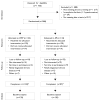Design and challenges of a randomized controlled trial for reducing risk factors of metabolic syndrome in Mexican women through water intake
- PMID: 24715012
- PMCID: PMC4282722
- DOI: 10.21149/spm.v55i6.7305
Design and challenges of a randomized controlled trial for reducing risk factors of metabolic syndrome in Mexican women through water intake
Abstract
Objective: To describe the design, methods, and challenges encountered during a randomized clinical trial aimed to promote water intake for reducing risks of metabolic syndrome in Mexican women.
Materials and methods: In a randomized clinical trial in Cuernavaca, Mexico, overweight and obese (body mass index [BMI] ≥ 25 < 39) women, 18 - < 45 years old with an intake of sugar-sweetened beverages ≥ 250 kilocalories per day (kcal/day) were randomly allocated to the water and education provision group (n = 120) or the education provision only group (n = 120).
Results: We screened 1 756 women. The main difficulties encountered were identifying participants with the recruitment criteria, delivering water to participants, and the time demanded from the study participants.
Conclusions: The trial's main challenges were difficulties surrounding recruitment, delivery of the intervention, and the time demanded from the study participants. Modifications were effectively implemented without jeopardizing the original protocol.
Conflict of interest statement
Figures
References
-
- Barquera S, Campos-Nonato I, Hernández-Barrera L, Flores M, Durazo-Arvizu R, Kanter R, et al. Obesity and central adiposity in Mexican adults: results from the Mexican National Health and Nutrition Survey 2006. Salud Publica Mex. 2009;51:S595–S603. - PubMed
-
- Barquera S, Flores M, Olaiz-Fernandez G, Monterrubio E, Villalpando S, Gonzalez C, et al. Dyslipidemia and obesity in Mexico. Salud Publica Mex. 2007;49:S338–S47.
-
- DiMeglio D, Mattes R. Liquid versus solid carbohydrate: effects on food intake and body weight. Int J Obes Relat Metab Disord. 2000;24:794–800. - PubMed
-
- Ebbeling CB, Feldman HA, Osganian SK, Chomitz VR, Ellenbogen SJ, Ludwig DS. Effects of decreasing sugar-sweetened beverage consumption on body weight in adolescents: a randomized, controlled pilot study. Pediatrics. 2006;117:673–80. - PubMed
Publication types
MeSH terms
Grants and funding
LinkOut - more resources
Full Text Sources
Medical

